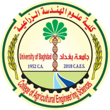The Agricultural Economics Department applies economic and managerial principles to the agricultural sector. Specifically, we prepare professionals in project management and market analysis. By doing so, we ensure optimal resource utilization to achieve food security.
Our Strategic Objectives Furthermore, the department focuses on economic feasibility assessments. In addition, we aim to develop specialized skills for the modern workforce. As a result, our graduates are equipped to lead development within the agricultural industry.
The Department of Agricultural Economics is a branch of the applied branches of public economics, which examines economic problems related to the individual’s efforts in agriculture and applies economic theories and principles to agricultural activities. This science also studies the means by which natural, human, and capital economic resources can be properly exploited. The first bachelor’s student in the Department of Agricultural Economics was in 1965 when the number of graduates reached 15 students. The main objective of the department is to qualify graduates of secondary education through the extensive scientific knowledge that they obtain in the fields of agricultural economics branches after graduating and obtaining a bachelor’s degree in agricultural economic sciences.
The Department of Agricultural Economics is one of the applied branches of general economics, which examines the economic problems related to the individual’s efforts in the task of agriculture and applies economic theories and principles to agricultural activities. This science also examines the means by which natural, human, and capitalist economic resources can be exploited in a correct economic manner. The first courses graduated. Department of Agricultural Economics in 1965, where the number of graduates reached 15 students.
Vision:
The Department of Agricultural Economics strives, with its human capabilities, to prepare specialized scientific cadres needed by the labour market and community service, and to be distinguished in its specialty by providing educational, research, and advisory services in order to achieve excellence for its students in light of local and global competition.
Message:
The Department of Agricultural Economics seeks to prepare specialized and qualified scientific cadres capable of developing and advancing the agricultural sector, providing them with skills, knowledge, and deepening scientific research in a way that contributes to preparing a graduate capable of keeping pace with the development taking place in the labour market. The department also contributes in the field of community service by providing consultations and training in Areas of specialization for public and private institutions to develop their capabilities and the capabilities of their employees.
Objectives:
The main goal of the department is to qualify graduates of preparatory school (scientific branch) through the extensive scientific knowledge that they obtain in the fields of agricultural economics branches after graduating and obtaining a bachelor’s degree in agricultural economic sciences. The cognitive goals that students of the agricultural economics department acquire are as follows:
1- Identify the methods of descriptive and quantitative economic analysis and their use in the field of scientific agricultural economic research.
2- Identify the basics of economic feasibility of agricultural projects.
-3 Understanding the theoretical foundations of managing and evaluating agricultural projects.
4 – Study marketing functions and agricultural marketing management.
5- Drawing and analyzing some features of agricultural policies.
6 – Study the analysis and forecasting of agricultural prices.
7- Learn about agricultural development theories.
8 – Understanding the performance of financing and credit institutions for farmers.
9-Understanding the foundations of agricultural planning
This department is interested in studying the economic aspects of the agricultural sector and the issues related to the production and marketing of agricultural products by providing its students with a theoretical and practical background that combines agricultural sciences and economic skills, enabling them to manage agricultural projects, analyze their problems, provide solutions to them, and provide consultations and services related to agricultural commodities. Contributing to formulating economic policies in the agricultural field.
The main areas of study in this section include production unit economics, consumer behavior, value chain of agricultural products, characteristics and dynamics of rural communities, and agricultural extension techniques.
Graduates of this department can obtain job opportunities in many fields, including agricultural banks, rural lending institutions, agricultural foreign trade, agricultural business, marketing and distribution of agricultural products, advisory services, extension organizations, and the media.
Skills that characterize a graduate of the Department of Agricultural Economics:
– Designs a business plan for a farm.
– A cost-benefit analysis is being conducted for an agricultural project.
– Calculates credit alternatives for investment and estimates the benefits resulting from each alternative.
– Develops marketing plans for agricultural projects and businesses.
– Negotiates with purchasing and selling entities for supplies and products.
– Understands and deals with producer and consumer behaviours.

